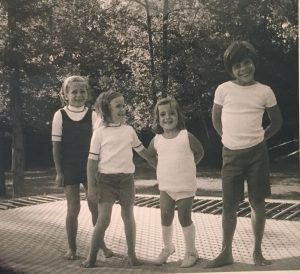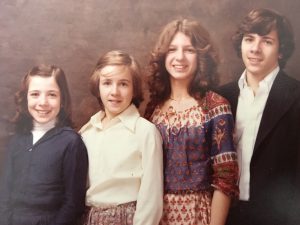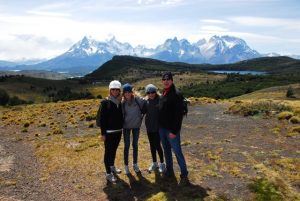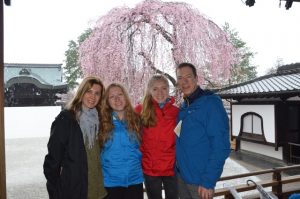Here’s the second contribution in our ongoing series Seeing Ourselves Through Others’ Eyes.
Hélène Stelian’s story raises the idea of what is often called the cultural “melting pot” that is America. A popular metaphor and one I was taught to believe in from grade school on, it holds that as new waves of immigrants reach our shores, they join the simmering “melting pot” and blend in.
But somewhere along the way, I began to think of us as more of a stew, where we still know which is the mushroom and which is the carrot — which is the Irishman outside of Boston and which is the Scot in the hills of Tennessee. The resulting dish wouldn’t be the same without each ingredient. In more simple terms: our diversity is what makes us so delicious. And we celebrate those very differences.
I’ll add Hélène’s various links at the end. For her bio from the start of this series, click here. Here’s her updated bio that came out after that introductory post:
Hélène Tragos Stelian is a life coach, speaker, and author.
As a certified life coach, she helps people who feel stuck or lost take bold steps into a life of renewed meaning and purpose. She leads workshops on many subjects, including purpose, perfectionism, success, and goal-setting.
In her blogs, Purpose Stories and Next Act for Women, she shares inspirational stories of people who have found their life’s calling—and are living it—at any age. She also writes about purpose, midlife, women, parenting, and college for other sites, including the Huffington Post.
Hélène is the author of three books: Moving to College, Finding the Right Colleges for You, and Getting Ready for Baby.
And now, here’s her story, telling us how she found herself, here in this “e pluribus, unim” (out of many, one) land.
###

Finding Myself—Out of the Cultural Melting Pot
I am the product of multiple cultures, yet at home in none. The daughter of a Greek-American and a Dane, I grew up in Paris, France, where I attended a French all-girls Catholic school—nuns and all. I knew I was different. Neither French nor Catholic, I was excused from catechism classes (I hung out with the other non-Catholic, a Protestant girl).

My parents spoke English to us at home, and my siblings and I answered in French. We spent Christmas holidays with my mother’s family in Denmark and summers with my father’s relatives in Greece. I was exposed to many languages in my home and on our travels, not to mention learning German at school.
The extent of my Americanism during those years was confined to regular visits to the American grocery store in Paris, where my siblings and I got to choose one box of sugary cereal each—I’d try to protect my Apple Jacks when my older brother and two younger sisters inevitably finished off their Cocoa Krispy’s (with my delayed gratification, I’d have aced the marshmallow test!)—and our twice yearly treat of a movie and lunch at McDonald’s on the Champs Elysees (the only one at the time in Paris), where I always had a Big Mac, French Fries, and a vanilla shake. Still, I felt more French than any other nationality, despite my American passport.

As you can imagine, moving to the US in 1977, when I was 13, was quite the culture shock. My father had always wanted his children to go to American universities, and with my older brother turning 16, it was now or never.
We spent the summer in Denmark while our furniture was on a slow ship to America (French wine smuggled into the many boxes of belongings), then flew to JFK, where my Dad, who’d arrived early, picked us up in our new station wagon, a shockingly enormous car by European standards.
This was to be the first of many surprises and discoveries as we acclimated to our new house in Greenwich, Connecticut, a tony suburb of New York City.
While I’d heard English at home from my parents, and taken one year of it at school, I did not speak it much at all. Our parents worked on our English with the help of books (I remember being shocked at the word “apologize” as I’d never heard such a strange sounding word with the same meaning as sorry). They also hired a popular Greenwich high school boy to help us learn baseball (we were no match for him despite his having only one arm, and I was not nearly coordinated enough to learn the sport, or its complex rules).
My dad decided to complete our American cultural education by taking us to the movie Saturday Night Fever, which only scared the heck out of me (and was the last movie you’d want to see with your father). Happily, there was a McDonald’s on the Post Road so we were able to indulge that craving enough that it soon lost it special appeal.
Now imagine a geeky, 13-year old walking into public school on her first day, in her Catholic school uniform complete with navy blue skirt, white button down blouse, and white bobby socks. I’d been put in 9th grade based on the number of years of schooling I’d had but was one year younger than my peers. Yep, you guessed it, I was bullied mercilessly. That was a rough year. From a fairly outgoing and confident French teen, I quickly turned into a shy and awkward American wannabe.
My siblings and I were hell bent on losing our heavy French accents. We did it by watching a lot of TV. At the time, there were only a few stations in the US, but the programming was far more family and kid friendly than anything we’d experienced in France. I was glued to the tube. Favorite shows? MASH, Love Boat, Charlie’s Angels, Brady Bunch, Happy Days, Three’s Company, Cheers, The Partridge Family, and Bewitched.

After 9th grade, which was part of middle school, I moved on to Greenwich High School, an enormous place (900 in my graduating class) where I could lose myself and escape the nasty girls who had bullied me and now had bigger fish to fry, as in older high school boys to chase. I made some friends but still felt very nerdy, not a label I embraced as fully as kids seem able to these days.
It didn’t help that I taught AP French Language my senior year, and found myself chasing down class skippers (Renata, I’m looking at you). Not a recipe for popularity. I was fascinated by the cliché groupings in the school: We had an enormous central atrium with areas staked out for the Greasers, Potheads, Jocks and Cheerleaders—just like in Happy Days!
Fast forward 35 years: I live in Chicago and am the married mother of twin 19-year old girls, a new empty nester. My husband and I were determined to expose our daughters to many nationalities and learn to appreciate diverse cultures; we made it a priority to travel extensively as a family.
We’ve visited every continent except Antarctica, with amazing voyages from hiking in Patagonia to climbing the Great Wall of China, cruising in the Galapagos islands to trekking with gorillas in Uganda, rafting the Grand Canyon to sailing in Sydney Harbor, visiting Peter’s grandparents in Romania to checking out my old home in Paris.




It’s only in my 50s that I’ve started feeling more authentically myself, and own it. My motley background has informed my empathy and understanding for those who feel “other.” I still pronounce some American words strangely and get quizzical looks when I’m in France and speak with fluidity yet without knowledge of the current lingo.
I guess it’s no surprise that I’m now a life coach, helping women figure out who they are and what they want out of life—how to own their authenticity and use it to find meaning going forward.
###
You can connect with Hélène on LinkedIn, Facebook and Twitter.
Thanks for adding your story, Hélène. Coming over as a young teen, must have been doubly traumatic; teen years are difficult enough without adding being totally uprooted from familiar surroundings and put in a class where everyone was a year older. It’s the to-be-expected bullying you suffered in 9th grade that struck a nerve. I’m of the “zero-tolerance” for bullying camp and, frankly, am agog that the powers that be in Greenwich CT weren’t more on top of that.
The mother in me wants to ask what form the bullying took, how you responded, what you told your parents, how they responded (and so many more). But the blogger in me just asks,
How about you? What questions do you have for Hélène?
Alexis Chateau
I love that you tackled the myth that America is a melting pot. Whenever people say that to me here, I tell them America is not a melting pot, but an international buffet. There is still a lot of segregation, and the funny part is, we tend to self-segregate as expatriates and immigrants.
I can’t say I relate to your need to kill the accent, though. I was bullied for my English accent in Jamaica right into high school. It wasn’t so much the accent, but the fact that I spoke English even in casual and informal settings. This isn’t really typical. Most people speak our Creole or at least broken English. I did not.
People found that strange, but I didn’t mind being on the outside. I once had to bring my passport to school to prove to my friends I am a citizen. And when I run into Jamaicans in the US, they rarely believe me when I say I’m Jamaican. Of course everyone here also asks, “Where’s the accent???” I grew up in “German Town” in Jamaica, and spent a lot of time around British family members.
I also love that you and your husband decided to show your children the world. At 27, I find that other people who have traveled, see the world so differently from those who have not. They have that empathy with “the others” as you said, and are better at seeing things from other people’s perspective. People who have not left home, have a tough time doing this.
All the best to you and yours!
Isabelle Winkler
I wasn’t able to put my finger on what resonated with me, but after Alexis’ comment, I full heartedly second the melting pot being an international buffet! (Such a strong methaphor on so many levels!!)
Thank you Hélèn and Alexis!
Janet Givens
Thanks for starting us off this morning, Alexis. And for introducing me to the “smorgasbord — international buffet — idea.” I like to think we’re closer than on a buffet table and “stew” offers that for me. But while we do still retain ethnic connections to our roots, I find Americans in general keep that more low key than they did, at least in Kazakhstan where “nationality” is included on your resume and your ID card.
So many things we can learn from each other if we just give ourselves the time. Thanks again.
Helene Stelian
Thanks so much for reading Alexis! I wish I’d been confident enough in my teens to love my accent. I can relate to what you’re saying about people not liking those who are different.
Of course now I really wish I had a French accent!
Merril Smith
Thank you for sharing your story, Hélène. When I was in seventh grade, my parents divorced, and we moved from Dallas, TX, to the Philadelphia suburbs. That was a culture shock–even though it was going or returning to a much a culture that I am much more at home with. (My family came from Philadelphia.) I can only imagine the much greater culture shock you experienced. How wonderful though that you’ve been exposed to so many languages and places through your lifetime, and that your daughters have, too.
Janet Givens
Hi Merril. Thanks for reminding us that America is a collection of subcultures, and even sometimes moving from the south end of a state to the north (I’m thinking of NJ, CA, and FL here) can be dramatic, never mind from Texas to the Philly suburbs. Some would say, “even the language was different.” Ha. We do pride ourselves on our various dialects.
I’m curious if you and your husband did much international traveling with your girls? I wanted to with my boys as they were growing up; indeed, for a time it looked like we’d be transferred to Belgium to live for a few years. But the hubs at the time was averse to travel so at home we stayed.
Thanks for joining us.
Merril Smith
Hi Janet,
No, we did not do international traveling with our girls. There always seemed to be too many issues–mainly time and money. 😉 Each daughter did go to Italy for a week (and I went with them) that were trips run by their Latin teacher. They also went to different states during several summer Latin (JCL) conventions, where they met other students from all over the country.
Yes, lots of subcultures!
Helene Stelian
Hi Merril. I think a move in the teen years is hard, no matter how close or far. And we do have so many micro-cultures here in the US. Thanks for visiting!
Susan Jackson
Very interesting, I hate bullies, it sounds as though you had a wonderful life and your kids are so lucky to have visited the world.
Janet Givens
Hi Susan. Thanks for sharing your thoughts here. I got that same idea, that even the bumps in Hélène’s life have been rather marvelous ones. She’s certainly pulled on them in this new career she’s forging.
And, I too have those questions about the bullies. Hélène?
Helene Stelian
You know Susan, I have been so lucky in so many ways, been afforded so many opportunities, I really can’t complain. And yes, love seeing the world and learning about foreign cultures. Thanks for reading!
Laurie Buchanan
Janet — I, too, am enamored with the “smorgasbord — international buffet — idea.”
I’m thoroughly enjoying this series!
Janet Givens
Thank you so much, Laurie. I’m very excited that it has come together.
Corie Skolnick
I’ve been a fan of the Hélène’s work for a while but knew little of her own history. This interview was wonderful! Now, it all makes sense! Thank you both. And, many thanks to Hélène especially for letting your own experiences culminate in your unique desires to help others in so many ways.
Janet Givens
Hello Corie and Welcome. I’m glad Hélène’s post here has brought you into my radar.
Helene Stelian
Well it’s a mutual admiration society then Corie! You are one of the most supportive people I’ve ever met, honestly. Your passion (and compassion) resonate in everything you do. So glad we are getting to know each other, even if online, and hopefully in person one day!!
Denise
I, too, am a huge fan of Helene’s work and evolution! Loved the story of your early life! Thanks for sharing!
Janet Givens
Hello Denise. Welcome to And So It Goes.
Helene Stelian
Thanks Denise!!
Tim Fearnside
Thanks, Helene and Janet. I can only imagine how difficult that move must have been at that stage in life. I’m wondering, Helene, aside from the language/accent barrier, what were some of the biggest cultural differences/challenges you faced? For example, were the attitudes or beliefs of kids in the U.S. markedly different than those of kids in France or other European countries? Were kids here more “cliquey?” Were there cultural differences, such as our consumer tendencies, that presented issues or challenges? Thanks! – Tim
Helene Stelian
Hi Tim,
To be honest, I shared what I remember from the move 40 years ago. I wish I’d kept a journal so I could recall more of these differences!
Tim Fearnside
Helene, as a fellow veteran of MASH, the Love Boat, and Happy Days, I completely understand :).
Janet Givens
Hi Tim, thanks, as always, for your thoughtful comments here. So, you’re a Love Boat aficionado. Do you know the current connection between the Love Boat and the US Senate?
Cathy M. Monaghan
Thank you for sharing your very interesting story, Hélène. You are very fortunate to have spent your life in different countries. Sorry to hear you were bullied here in the USA though.
Alexis & Janet, I also love the “international buffet” and/or “stew” ideas. Together, yet different.
Helene Stelian
Hi Cathy and thanks for reading. Yes, I do feel more fortunate than not! So grateful to have seen and lived in other parts of the world, and also happy to make the USA home.
Janet Givens
Hi Cathy, thanks for stopping by. I’m glad that “international buffet” idea resonated with you.
Janet Givens
I love seeing all the new “faces” here. Thanks for that, Helene. I’m afraid I’ve got limited Internet time through Sunday. I’ll send personal Replies to all Commenters when I return
I’m at the Yale Writer’s Conference, exploring my first stab at YA fiction. And, in many ways, this has not been unlike being dropped (once again) into a new culture. Many many things different; many often commonly done activities (like eating lunch) need more attention on my part. And remembering to take my room key with me … But I’m learning new things and am eager to explore some new ideas in my YA piece. (like changing to first person).
Janet Givens
Helene, I want to thank you again for joining us this week with your story and bringing your many followers along. You get special kudos for having the post with the most FB shares: 83 the last time I looked. Wow. Thank you so much participating in our series on Seeing Ourselves Through Others’ Eyes. And, for those of you eager to expand your blog following, I encourage you to check out Helene’s recent blog post, http://nextactforwomen.com/writing/memoir-becky/ where she introduces us to a new memoir writer.
I’ll be back on Wednesday with my fellow Vermonter & friend, Ella Reznikova’s story of what she learned on her first visit to America.
Helene Stelian
The honor has been all mine, Janet!!